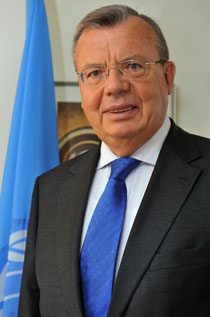Give hope back to victims
Not a single day goes by without a fresh report of women, men and children being sold into modern-day slavery; forced to work in sweatshops, fields and brothels, hidden in plain sight in the richest countries in the world, and in the poorest. Human trafficking exploits the dream of millions for a better life for themselves and their children. Traffickers steal this hope to turn people into commodities in a perfidious trade that, despite our efforts, continues to operate with impunity.

Yuri Fedotov
This 30 July, we are marking the first ever United Nations World Day against Trafficking in Persons. The day aims to raise awareness of the plight of human trafficking victims, and help promote and protect their rights. It is a chance to express our solidarity with the vulnerable, and pledge to give back the precious commodity stolen from them: hope.
The Protocol to Prevent, Suppress and Punish Trafficking in Persons, Especially Women and Children, under the United Nations Convention against Transnational Organized Crime came into force a decade ago.
The Protocol was a major step forward in the fight against modern slavery. For the first time, an international instrument called for all acts of human trafficking to be criminalized, including trafficking for sexual exploitation, forced labour, organ removal, domestic servitude and slavery-like practices.
When the Protocol was adopted, less than half of countries in the world had legislation criminalizing human trafficking. Now more than 90% of countries do.
On 30 July 2010, the General Assembly adopted the Global Plan of Action to Combat Trafficking in Persons, which gave further impetus to UN efforts to fight human trafficking. It established the United Nations Voluntary Trust Fund for Victims of Trafficking in Persons, and mandated the UN Office on Drugs and Crime with producing the Global Report on Trafficking in Persons to help shed light on the crime.
Last year, GA resolution 68/192 on improving the coordination of efforts against trafficking in persons called for 30 July, the day the Global Plan of Action was adopted, to be designated the World Day against Trafficking in Persons.
Now we need to take this opportunity to further advance global action against trafficking.
Because despite the progress of the past ten years, legislation in some countries does not always comply with the Protocol, and fails to cover all forms of trafficking and their victims. In effect, there are billions of people who are not adequately protected and remain vulnerable.
Even when legislation is enacted, implementation falls short. Since 2007, the number of convictions reported globally has remained extremely low. As UNODC’s forthcoming Global Report on Trafficking in Persons shows, some 15 per cent of countries did not record a single conviction between 2010 and 2012, while 25 per cent only recorded between one and 10 convictions.
This is of great concern because convictions not only ensure that the offenders have to answer for their crimes, but send an important signal to criminals – for whom human trafficking is a low-risk, high-profit activity – that this violation will not be tolerated.
At the same time, we have found that more and more detected victims are children, particularly girls under the age of 18.
We can all do our part to fight human trafficking. Awareness is key, because even though human trafficking is a transnational crime happening everywhere, it is a crime that is committed locally, in our neighbourhoods and local communities.
The majority of convicted traffickers – the recruiters, transporters and exploiters – are from the same country as the victims, or are nationals of the country to which the victims are taken. Even when international borders are crossed, the origin and destination countries are often within the same region.
I encourage everyone to do and give what they can.

#Givehope
The United Nations Voluntary Trust Fund for Victims of Trafficking in Persons supports grassroots organizations directly assisting victims of human trafficking. The fund is financed solely through voluntary contributions from governments, the business community and people of goodwill. Every donation counts.
Let us mark this first United Nations World Day against Trafficking in Persons by doing more. We need more awareness, more education, more training and more determination to see – and stop – what is happening right in front of our eyes.
Yury Fedotov is the Executive Director of the UN Office on Drugs and Crime
Join the #igivehope campaign today and show your solidarity with victims of human trafficking.
Have a heart for victims of human trafficking and contribute to the United Nations Voluntary Trust Fund.
Maak MO* mee mogelijk.
Word proMO* net als 2790 andere lezers en maak MO* mee mogelijk. Zo blijven al onze verhalen gratis online beschikbaar voor iédereen.
Meer verhalen
-
Report
-
Report
-
Report
-
Interview
-
Analysis
-
Report










 Oxfam België
Oxfam België Handicap International
Handicap International